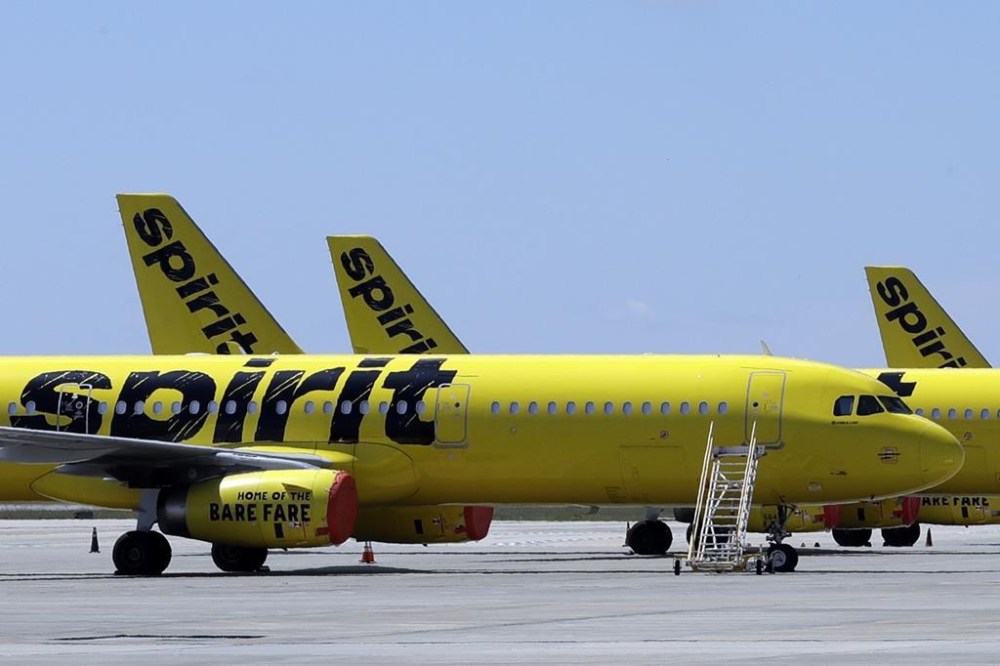Spirit Airlines delays release of Q3 financial results as debt restructuring talks heat up
Advertisement
Read this article for free:
or
Already have an account? Log in here »
To continue reading, please subscribe:
Monthly Digital Subscription
$0 for the first 4 weeks*
- Enjoy unlimited reading on winnipegfreepress.com
- Read the E-Edition, our digital replica newspaper
- Access News Break, our award-winning app
- Play interactive puzzles
*No charge for 4 weeks then price increases to the regular rate of $19.00 plus GST every four weeks. Offer available to new and qualified returning subscribers only. Cancel any time.
Monthly Digital Subscription
$4.75/week*
- Enjoy unlimited reading on winnipegfreepress.com
- Read the E-Edition, our digital replica newspaper
- Access News Break, our award-winning app
- Play interactive puzzles
*Billed as $19 plus GST every four weeks. Cancel any time.
To continue reading, please subscribe:
Add Free Press access to your Brandon Sun subscription for only an additional
$1 for the first 4 weeks*
*Your next subscription payment will increase by $1.00 and you will be charged $16.99 plus GST for four weeks. After four weeks, your payment will increase to $23.99 plus GST every four weeks.
Read unlimited articles for free today:
or
Already have an account? Log in here »
Hey there, time traveller!
This article was published 13/11/2024 (396 days ago), so information in it may no longer be current.
NEW YORK (AP) — Shares of Spirit Airlines plunged Wednesday after the budget airline said that it won’t announce quarterly financial results on time while it continues talks with bond holders to restructure its debt.
Spirit said negotiations are progressing toward an agreement that would protect creditors and customers. However, the company said if such a deal is reached, it would be expected to wipe out existing shares.
The stock was down 58% in afternoon trading Wednesday.

The low-cost airline has been struggling to recover from the pandemic-caused swoon in travel. A federal judge blocked an attempt to sell the airline to JetBlue after the Justice Department sued on antitrust grounds.
Spirit disclosed after the market closed Tuesday that it had notified the Securities and Exchange Commission it would be late in filing its third-quarter financial report while it continued discussions with holders of debt that is due for repayment in 2025 and 2026.
If it can reach a deal, Spirit said, it would go through “a statutory restructuring” that would protect creditors, employees, customers and companies that do business with the airline but “is expected to lead to the cancellation of the company’s existing equity.”
The Florida-based airline said it was also “exploring strategic alternatives” — often a euphemism for a sale, merger or restructuring. The Wall Street Journal, citing anonymous sources, reported late Tuesday that the airline was discussing terms of a possible bankruptcy filing with its bondholders after merger talks with Frontier Airlines broke down.
The company also gave grim guidance about its third-quarter performance. Spirit said its operating margin would be 12 percentage points worse than last year’s third quarter, when it was a negative 15%. Revenue will be down and expenses up compared with a year earlier.
TD Cowen analyst Tom Fitzgerald said Spirit’s announcement creates the risk that customers will book on other airlines instead, putting even more pressure on Spirit’s liquidity.
Spirit, the nation’s biggest budget airline, has lost more than $2.5 billion since the start of 2020 and faces looming debt payments totaling more than $1 billion.
People are still flying on Spirit Airlines. They just are not paying as much.
In the first six months of the year, Spirit passengers flew 2% more than they did in the same period last year. However, they were paying 10% less per mile, and revenue per mile from fares was down nearly 20%, contributing to Spirit’s red ink.
It’s not a new trend. Spirit failed to return to profitability when the coronavirus pandemic eased and travel rebounded. There are several reasons behind the slump.
Spirit’s costs, especially for labor, have risen. The biggest U.S. airlines have snagged some of Spirit’s budget-conscious customers by offering their own brand of bare-bones tickets. And fares for U.S. leisure travel — Spirit’s core business — sagged most of this year because of a glut of seats on domestic flights.
Peter McNally, an analyst at investment-research firm Third Bridge, said Spirit used debt to grow aggressively coming out of the pandemic to increase its market share. But its costs rose and pricing power was damaged when other airlines also added flights, he said.
Frontier Airlines tried to merge with Spirit in 2022 but was outbid by JetBlue. The Justice Department sued JetBlue and Spirit, saying a merger would drive up prices for Spirit customers who depend on low fares, and a federal judge agreed in January. JetBlue and Spirit dropped their merger two months later.
Spirit and Frontier, based in Denver, declined to comment on possible merger discussions. Savanthi Syth, an airlines analyst for Raymond James, said she still believes that a merger of the two is likely once Spirit restructures to reduce its costs.
U.S. airline bankruptcies were common in the 1990s and 2000s, as airlines struggled with fierce competition, high labor costs and sudden spikes in the price of jet fuel. While some airlines survived the turbulence and a wave of mergers, Pan Am, TWA, Northwest, Continental and US Airways all disappeared.
The last bankruptcy by a major U.S. carrier ended when American Airlines emerged from Chapter 11 protection and simultaneously merged with US Airways in December 2013.

